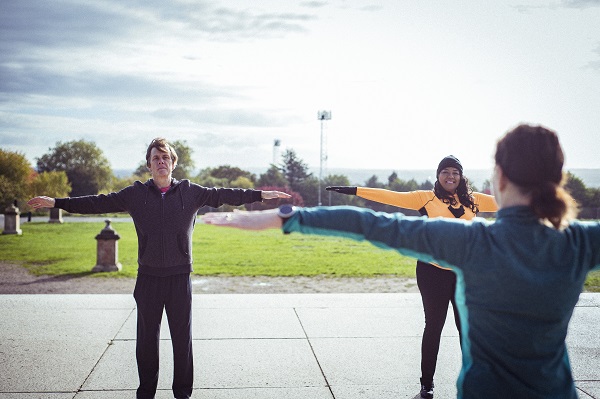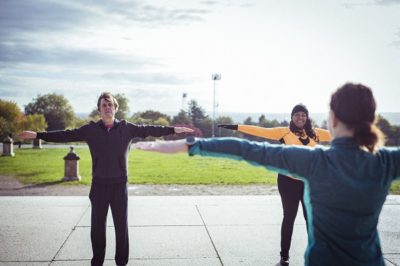



Can exercise help people with pancreatic cancer?
A programme run by Dr Gillian Prue and Dr Dominic O'Connor at the Queens University Belfast, funded by Pancreatic Cancer UK, is taking a deeper dive into whether exercise can help people with pancreatic cancer.
The team the Queens University Belfast conducted a review of existing research in this area and the results of this suggest positive outcomes. It provides a strong rationale for the supervised exercise trials they will be carrying out over the next few months. Dominic explains more in his blog below:
Understanding the role of exercise in supporting people with cancer has become of more and more interest to researchers over the last 20 years. Research mainly involving people with early stage breast cancer has shown that exercise may provide many benefits throughout the spectrum of living with cancer, such as helping to combat fatigue, improving body weight, priming the immune system and improving treatment tolerance.
From this evidence, exercise recommendations for individuals with cancer suggest all patients try to achieve 150 mins of aerobic exercise (e.g. walking, cycling) exercise and resistance training (e.g. lifting weight) a couple of times per week. But this can be difficult to translate for people with pancreatic cancer – those with early stage breast cancer may be more physically capable of exercising as their symptoms are often less severe. Current exercise recommendations made may be challenging or unachievable for many with pancreatic cancer.
We are lucky enough in Belfast to be funded by Pancreatic Cancer UK, to run a study looking at whether a tailored exercise regime is feasible, and whether it improves quality of life for people with pancreatic cancer who are undergoing chemotherapy. The study is called PancREatic Cancer and Individualised Supervised Exercise (PRECISE), and we started recruiting participants here in Belfast in November. Luckily we have been able to continue with supervised exercise sessions despite Covid-19 restrictions.
Before recruiting participants, we reviewed all of the current established knowledge (including published papers) on this topic, and documented our findings, but I will provide an overview of what we found and how the results will benefit people with pancreatic cancer below.
We identified 12 studies (combined total of 300 participants across the 12 studies) which had used exercise with patients undergoing treatment. The majority of these studies were rehabilitation studies, meaning exercise was used with participants during chemotherapy, but after surgery. The remaining studies looked at exercise before surgery (known as prehabilitation) or during palliative chemotherapy. One study even had a single participant exercise on a stationary bike while they were receiving their chemotherapy infusions. Most studies involved both aerobic exercises such as walking or cycling and resistance training, based on the recommendations for cancer patients, and the majority used home-based unsupervised exercise, with one comparing the difference in results between supervised and unsupervised exercise.
When we looked at the effectiveness of exercise for individuals with pancreatic cancer, we found:
- improved muscle strength,
- improved physical function (i.e. ability to carry out normal activities such as walk, or rising up from a chair),
- improved feelings of fatigue,
- improved quality of life.
Although we found that most studies used unsupervised exercise, the study which compared supervised and unsupervised exercise found that participants in the unsupervised group completed more overall sessions.
Most importantly, no serious problems were reported in the studies, which would suggest that exercise can be done safely by people at all stages of their treatment. This is an important finding especially in the current climate with many gyms closed and group exercise programmes cancelled due to Covid-19 restrictions, and more people exercising at home alone or with a family member. This provides a strong rationale for our study; that is, participants will train more efficiently if supervised, and therefore may be able to achieve greater benefits in fewer sessions.
Overall, the review showed us that exercise can be done both safely and effectively by individuals with pancreatic cancer.
We will be recruiting participants into the PRECISE trial until the end of the year, and we will be sure to share the results of this trial with you.

